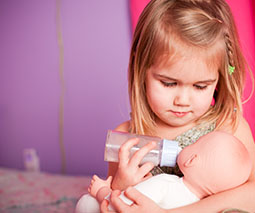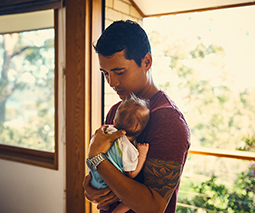Having a baby without job security: How one creative couple made it work

The Mother Shift’s Jacinta Tynan spoke to broadcaster, journalist and mother, Shevonne Hunt, about juggling family life when mum is the breadwinner and dad, the primary caregiver.
Leap, and the net will appear?
After their first child was born, Shevonne and her husband, freelance photographer Daniel Guerra, realised Shevonne had more work opportunities readily on tap, so Daniel became a stay-at-home dad.
Shevonne says that both she and Daniel had creative, but at-times financially precarious careers. Daniel’s work flow was hard to predict and Shevonne was working as a contractor, with no maternity leave entitlements.
Nevertheless, they persisted, finding themselves delighted to be expecting a baby, while wondering how they’d manage to pay the bills.
“I kind of fell pregnant thinking well if I wait to be made an ongoing staff member with all those entitlements, I’ll never have a baby,” Shevonne told The Mother Shift. “So let’s go ahead and do it. I’m sure it’ll take care of itself and we’ll be fine.”
“For most of my pregnancy, I wasn’t sure I was going to get [maternity leave]. So the first pregnancy, in terms of how we were going to manage maternity leave, was one of the most stressful times of my life.”
Know your rights
The Mother Shift’s resident careers counselor and psychologist, Kirsty Levin says mums in Shevonne’s situation naturally feel unnerved, but getting educated on employee rights is key.
“It’s really important to become well-informed about the legislation and what you will be eligible for as a casual contractor, a part time employee or even a full time employee.”
“If you’ve been employed for between 10 and 13 months before you’ve had your baby and you’ve worked for at least three hundred thirty hours during that period, with no more than an eight week gap between two consecutive working days, then you’re eligible for the government paid parental leave scheme”, Kirsty explains.

Rolling with it
Circumstances dictated that Shevonne would be the one to return to work, but it was more of an organic response, and less of a decision, she admits.
“It just so happened that radio, especially radio producers, they need a consistent amount of time they need you – four days or five days or three days, week in week out – whereas photography was like a one-off 18 hour day or a week of work or something like that.”
“So we didn’t actually sit down and say, okay you’ll go back to work more and Daniel, you’ll stay home and be the main carer,” Shevonne recalls.
Career conversation
Shevonne told The Mother Shift that although it was reassuring to not have her career path interrupted too dramatically by having a family, she really did feel torn and want to be at home more.
“I think the world looks at those situations in black and white dichotomies; it’s like she’s the career woman, he likes being at home with the kids … Well I never said that. I want us to co-parent, I’m saying yes to these hours and these days because we literally have no choice.”
To avoid relationship resentment, Kirsty suggests having an “open explicit conversation about what your needs are what your expectations are and you can go from there and plan out who’s going to work when, how and why”. It’s vital to ensure everyone’s needs are being carefully considered and (hopefully) met.
Mum ambition
For Shevonne, unravelling just how the mother and career parts of her life fit together proved a challenge, once her baby (and later a second child) were born. Her career path looked different to what she had envisaged, and she suddenly found herself weighing up priorities in ways she had not anticipated.
“I think the thing was it took a few years, probably until the birth of my son, to let that ambition or the understanding of ambition settle.”
“It wasn’t that I didn’t want to progress my career, I just knew that what it would take to do it wasn’t worth it for me … We talk a lot about working women doing well and I’m not saying that you can’t but the working women I know, or I’ve listened to, who’ve done well have way more energy than I do.”

Pushing for equality
While for some onlookers, having Daniel as the primary caregiver was a kind of novelty, Shevonne says it helped level the playing field in her relationship in some helpful ways.
“I say this to everyone. If you’re going to have babies with someone, make sure they have three to six months at home as a full-time carer because then they’ll understand what it is; not just fun times when you get home from work. So he has a really good understanding of what it is like to be with the kids.”
Now that their kids are a little older, and Daniel is working full-time, Shevonne says that life is much less fraught and things are falling nicely into place.
“I saw my GP the other day and we were doing a mental health plan for my anxiety and one of the things on the list said ‘relationship stress over financial issues’ and she looked at me, and I went, ‘You can delete that’ and she just deleted it, and I went, “Oh my god, that is amazing’.”
Shevonne says the challenges and triumphs of being a mum have transformed a life she thought she had all worked out, pre-kids.
“My children have taught me that there are so many different ways to be in the world and that the most important thing is just to keep learning.”
You can listen to The Mother Shift on Apple Podcasts and Google Podcasts.















